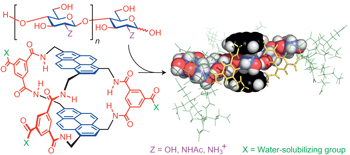
Tiddo J. Mooibroek, Juan M. Casas-Solvas, Robert L. Harniman, Charles M. Renney, Tom S. Carter, Matthew P. Crump & Anthony P. Davis*
In the top 5% of all research outputs by news and social media attention on Altmetric.
Abstract
Cellulose, chitin and related polysaccharides are key renewable sources of organic molecules and materials. However, poor solubility tends to hamper their exploitation. Synthetic receptors could aid dissolution provided they are capable of cooperative action, for example by multiple threading on a single polysaccharide molecule. Here we report a synthetic receptor designed to form threaded complexes (polypseudorotaxanes) with these natural polymers. The receptor binds fragments of the polysaccharides in aqueous solution with high affinities (Ka up to 19,000 M−1), and is shown—by nuclear Overhauser effect spectroscopy—to adopt the threading geometry. Evidence from induced circular dichroism and atomic force microscopy implies that the receptor also forms polypseudorotaxanes with cellulose and its polycationic analogue chitosan. The results hold promise for polysaccharide solubilization under mild conditions, as well as for new approaches to the design of biologically active molecules.